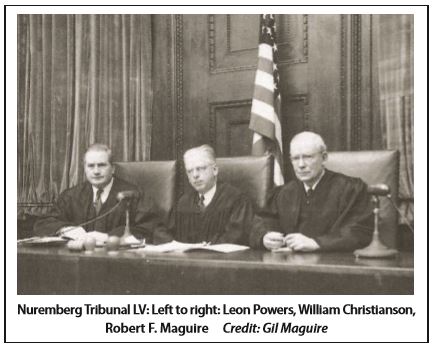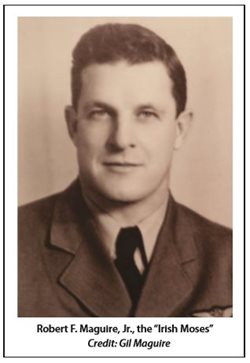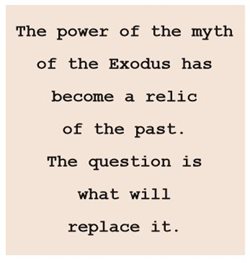By Gil Maguire

1948 was going to be a busy year for my family. My grandfather, Robert F. Maguire, had just been appointed to serve as a judge in the Nuremberg War Crimes trials. My father, Robert F. Maguire, Jr., a pilot for Alaska Airlines, had just finished an assignment in the Philippines where he had organized a charter airline called Far East Air Transport which would later become Philippine Airlines. He was now headed to what soon would become the Jewish state of Israel to take charge of flying Jews from around the world to their new national home. I was four years old.
I’d always thought my focus on the history and conflict over Palestine began with my father’s role as chief pilot in Operation Magic Carpet. But I think it really began with my grandfather’s service as a judge in the Nuremberg Military Tribunal in 1948-49. He was one of three judges in the last of the trials, the so-called Ministries Case whose main focus was the crimes committed by Nazi bureaucrats during the occupation of countries they had invaded and conquered.
My grandfather’s role in the Nuremberg War Crimes trials was important to our family because it showed we were not only involved in fighting (and dying) to defeat the Nazis but also in their trial and conviction for the war crimes they committed, including against the Jewish people in the horrors of the Holocaust.
Our role in World War II and its aftermath is a source of pride for my family. None of our many wars since has had anywhere near the same effect. That was a war to end all wars and they were our greatest generation. All of our many conflicts since have been ambiguous affairs that ended indecisively, were poorly disguised defeats, or have refused to end at all. Not the stuff of heroes and national myths. The death of an uncle at Guadalcanal in 1942 seemed painful but worthwhile. A nephew’s loss of a leg fighting in Iraq is equally distressing but more ambiguous.

While there is something noble about Nuremberg and even heroic about Magic Carpet, there is no little irony in these accomplishments: In 1948, my grandfather was judging and convicting German Nazis for war crimes involving its illegal occupation of foreign lands including forced deportations of Jews, unlawful destruction or seizure and appropriation of private and public property, and other crimes of occupation.
At the same time, similar crimes of occupation were being committed by Zionist Jews in Palestine, later Israel, against the indigenous Arab people of Palestine. They too suffered forced deportation or ethnic cleansing as well as destruction and seizure of their lands, homes, and personal property. Over 500 Arab villages and small towns in Palestine were leveled by Israeli forces to prevent the inhabitants from having homes to return to. Israel’s refusal to allow Palestinian war refugees to return to their homes after hostilities had ended was also a war crime. Unlike Nazi war crimes, Israel’s would go unpunished. Obviously the horrendous Nazi war crimes aimed at the extermination of European Jews have no applicability or parallel to Palestine and the conduct of Zionist Jews toward the Palestinian Arab population in 1948 or after.

To further the irony, my father’s efforts bringing deserving Jewish refugees to Israel during this period were inadvertently in furtherance of the Zionist goal of removing Palestinian Arabs from the lands captured and occupied by the Israeli army in order to replace them with non-indigenous Jews. The homes, lands, and personal property confiscated from ethnically cleansed indigenous Palestinian Arabs became the property of non-indigenous Jews flown to Israel by my father in various operations he headed including Magic Carpet and Ali Baba.
Israel in 1948 was desperate for people to build the country they desired but only Jews would suffice. Palestinian Arabs weren’t acceptable and some 90 percent were forced to leave and never allowed to return to their lands, homes, and personal property. Despite their Semitic ancestry, they were the wrong kind of people.
My father was proud of his role bringing the Jews to Palestine, but he was also well aware of the price Palestine’s indigenous Arabs would pay. The forced removal of some 750,000 from their homes and lands as tens of thousands of Jews were flown to Israel as replacements.
The myth of Magic Carpet and the Irish Moses hid some stark realities. In some ways even my grandfather’s Nuremberg trials was also more myth than truth. Of the 19 convicted defendants in the Ministries Case, with sentences up to 25 years, all were pardoned and released in 1950 or 1951, only a year or two after their convictions. The politics of the emerging Cold War had triumphed over meting out justice to convicted Nazi war criminals.
Later generations of my family would research and write about both Nuremberg and Magic Carpet: My nephew, Peter Maguire, a historian and war crimes investigator, wrote about the Nuremberg trials in Law and War: An American Story Columbia University Press (Revised Ed., 2010). He is often interviewed or called to testify on incidents involving war crimes and has written other books and articles on the subject including Facing Death in Cambodia Columbia University Press (2d Ed. 2005). My own focus on the Israeli-Palestinian conflict began with articles I wrote and published (primarily on Mondoweiss.net) starting in 2008 and culminated this year (2019) in the publication of my novel about the conflict, The Exodus Betrayal: A President Confronts Israel.
OPERATION MAGIC CARPET AND THE ROLE OF THE IRISH MOSES
In 1948, Alaska Airlines was a small charter airline operating on a shoestring by using cheaply acquired World War II surplus cargo aircraft and war veteran pilots to fly them. Alaska and its aggressive new general manager, James Wooten, began by getting contracts to fly supplies for the Berlin Airlift, and then for flying Jewish refugees from Germany and even China to what was about to become the state of Israel.[1]
Robert F. Maguire Jr., my father, flew in all those operations and as chief pilot managed Alaska Airline’s contracts to fly the Jewish refugees of Europe, the Middle East, and even from Shanghai, China to Israel. In 1949, as the Communist Chinese were taking over China, he rescued a trapped Jewish community in the northern Chinese city of Tientsin by chartering a ship to take them to Hong Kong. From there they were then flown to Israel, many in a plane he piloted.
When Wooten landed a big contract to fly 50,000 Yemeni Jews to Israel, Maguire was picked to head that project which became known as Operation Magic Carpet. It was underfunded and lots of strict rules for aircraft maintenance and aircrew flying hours were repeated violated. Eventually, the Civil Aeronautics Board watchdog agency imposed heavy fines on Alaska and forced it to give up Operation Magic Carpet. Maguire was secretly tasked with creating a new airline called Near East Air Transport to finish the contract even though Alaska owned the planes and the new company.
The Jews of Yemen were a snapshot into ancient times and were thought to be among the lost tribes of Israel. They trekked for days through the high deserts of Yemen to arrive at the pickup point in British controlled Aden. Many died along the way and over 80 were slaughtered in an Arab riot in Aden in 1948. Those that survived the long trek arrived with a few personal belongings but with family Hebrew bibles in hand. The elders of each village carried the Holy Torah Scrolls of their synagogues aboard the planes. Few had ever seen an airplane so when faced with a huge silver-colored DC-4, they often refused to board.
The Old Testament came to the rescue. Maguire had eagles painted over the airplane doors and an Israeli ground crewman would read the passengers a quote from the Book of Isaiah foretelling of their journey across the desert wilderness and how the Lord would transport them on the wings of eagles. The silver planes, they were told, were the eagles complete with silver wings. Convinced that the silver birds were a fulfillment of a biblical prophecy, the Yemeni Jews then eagerly boarded the planes, their Torah scrolls in full view.

Once aboard the planes, their education continued. Unfamiliar with modern facilities, the passengers had to be instructed on using the large, barrel-like latrine at the rear of the plane. One stewardess recalled gesturing to a village elder how to use the latrine. He smiled then promptly climbed into the barrel feet first.
Maguire said the urine, vomit, and bodily waste on the cabin floors from 150 passengers sitting on wooden benches for a typically eight hour flight threatened to corrode the aluminum structure of the planes, so the cabins had to be thoroughly hosed down upon arrival and then were doused with cheap perfume to help disguise the lingering smell. The resulting combined odor seemed much worse, Maguire recalled.
On one flight, Maguire smelled smoke. Fire in the cabin was the dread of every crew member. He rushed back into the cabin and saw a stewardess angrily yelling as she frantically stamped out a fire started by some of the passengers who were very cold in the unheated cabins. To handle the long distances, the cabins contained an extra fuel tank in the main aisle. They had started their fire between the fuel tank wall and the cabin floor. Fortunately, there was no explosion.
Despite the many problems and frustrations incurred, those that flew in operations Magic Carpet, Ali Baba, and the China run think of their experiences as the high point of their lives. Maguire talked of the cheers and tears that would accompany his announcement that they had finally arrived in Israeli airspace. On the ground there would be prayers and more tears even among the hardened crewmembers as Yemeni Jews descended the stairway onto the hard but welcoming ground of Eretz Yisrael. Maguire would recount those scenes on the eve of his death, 56 years later, and still choked up at the memory.
The flying was also dangerous as the routes were over Arab territory and the Arabs were fighting a war with Israel. It was not uncommon for the planes to be shot at as the entire flight was flown along the borders between Arab countries, none of whom gave clearance for the flights. A few planes were hit although none were downed. On one flight, Maguire was forced to land to get fuel in Port Sudan. He feared that he, his crew, and their human cargo of 150 Yemeni Jews would be interned, imprisoned, or even worse. When an armed jeep approached his plane, he requested that his airplane be refueled. His request was denied and he was told to evacuate his crew and passengers. He said he would but informed the officials he would need doctors and ambulances as many of his passengers were infected with smallpox. He was ordered to leave his passengers on the plane and soon a fuel truck appeared, refueled his plane, and his armed guards demanded he immediately depart. A few hours later, he and his smallpox-free passengers arrived safely at Lod airfield near Tel Aviv.
As Operation Magic Carpet was winding down, Alaska and Wooten surreptitiously obtained a new contract to fly some 150,000 Iraqi Jews to Israel. This project was also headed by Maguire using Near East Air Transport as the named air carrier and became popularly known as Operation Ali Baba. As with Operation Magic Carpet, the overall project was managed and funded by the American Jewish Joint Distribution Committee which was heavily involved in arranging transportation for Jewish refugees from around the world to Israel.
Maguire had expected to be richly rewarded once the operations concluded. He said he was told large monthly bonuses were being deposited in a Swiss bank account in his name and would be paid once the work was completed. This turned out to be a false promise as no Swiss bank account in his name existed and his requests to be paid were refused. Upon his return to the US, he met with an expert in international law who told him he had virtually no chance of succeeding in an international lawsuit. He was angered and devastated by the news. He now had to begin a new career in commercial real estate starting from the bottom. While he would eventually succeed, the decade of the 1950s were financially challenging for Maguire and his family.
A certain amount of chicanery was involved in Maguire’s work as he was listed as the owner of Near East Air Transport. It was actually owned by Alaska Airlines, which had been prohibited from being involved in these charter operations by the US Civil Aeronautics Board. I suspect the secret bonuses offered Maguire were an incentive for him to illegally operate the airline, Near East Air Transport, as a front for Alaska Airlines in violation of the orders of the US Civil Aeronautics Board the predecessor to today’s US Federal Aviation Authority.
Maguire would later be lauded for his role managing Operations Magic Carpet and Ali Baba. David Ben Gurion, Israel’s first prime minister, allegedly referred to him as “the Irish Moses” for his role in returning some 200,000 Jewish refugees to their promised land. Despite the fame, he remained bitter about not being paid when the operation terminated. While he spoke highly of Israel’s accomplishments in creating a state for the Jews, as the years went by, he became more and more critical of Israel’s policies and actions and felt it had taken advantage of the massive economic and political support it had received from this country.
In 1998, in preparation for Israel’s fiftieth anniversary, Maguire was offered an expense-paid trip to Israel to join in the fiftieth anniversary celebration where his role as “the Irish Moses” would be celebrated. He politely refused the offer and later said he didn’t want to be used as a propaganda tool for Israel to celebrate the return of Jewish refugees to Israel while at the same time ignoring the treatment of hundreds of thousands of Palestinian Arabs who had been forced to leave their land, homes, and property. I also think he retained some bitterness over the funds he was promised but never paid at the conclusion of the two operations.
In 2004, a year before his death, Maguire finally received the public recognition he deserved when he was awarded the Medal of Valor by the Simon Wiesenthal Center at the Los Angeles Museum of Tolerance for his role in Operation Magic Carpet flying thousands of Jews from Yemen to the new state of Israel in 1948-49.[2] It was a gala event that included a documentary movie of Magic Carpet in which Maguire described many of his experiences and how emotional it had been for him to see the joy and happiness of his Yemeni Jewish passengers as they arrived in Israel as foretold in the Old Testament. The highpoint of the evening for him and our family was meeting several Yemeni Jews who had been rescued from Yemen during Operation Magic Carpet, one of whom had been born on one of the flights. Despite his eventual disillusionment with Israel, Maguire was proud of what he and his band of fellow brother pilots had accomplished. He felt they had played an important role in history in returning the people of a lost, small, primitive tribe of Jews to the promised land, to Israel. Although he was not a practicing Christian, he saw his and the actions of his pilots and their planes as a mystical fulfillment of a biblical prophecy.
Both operations, Magic Carpet and Ali Baba, came under some criticism in later years for mismanagement by Alaska Airlines, Near East Air Transport, the American Jewish Joint Distribution Committee as well as financial irregularities and corruption by various representatives in Aden and Yemen and by the Israeli government’s handling of the arriving refugees in Israel.[3] Magic Carpet and Ali Baba were not the idyllic operations they were later depicted as. These were shoestring operations that were filled with the range of human frailties, including greed, but also with ample doses of human courage and dedication.
In 1957, my father received an indirect accolade for his role in Magic Carpet when the novel Exodus was published. In Book 5, entitled, “With Wings of Eagles”, Operation Magic Carpet is described in largely accurate detail, substituting “Artic Circle Airways” for Alaska Airlines and the head of the airline as “Stretch” Thompson instead of James Wooten. Robert F. Maguire, the chief pilot for Operation Magic Carpet, is portrayed by a character named Foster J. MacWilliams. He is an overly heroic stick figure, a heavy drinker and carouser who sees little wrong in getting plastered the night before a major flight and being “carted” to the tarmac the next morning with a horrible hangover. He bears no resemblance to Maguire who would have fired any pilot exhibiting such behavior. While MacWilliams is described as “the best goddam chief pilot any goddam airline ever had”, that label more properly fit Maguire who was dedicated to his mission, courageous, and a superb pilot.
Despite his accomplishments as the fabled “Irish Moses”, Maguire was never contacted by the book’s author or publisher to help publicize the novel. This probably reflected continuing animosity between the Israelis, Alaska Airlines and Maguire over his rancorous parting from Operations Magic Carpet and Ali Baba. Uris, in his research for the novel, undoubtedly spent time with both Richard Wooten of Alaska Airlines and Harry Vitalis, who directed the American Jewish Joint Coordinating Committee in Tel Aviv. Maguire had fallen out with both by the time he left Israel. He sued Wooten for unpaid wages after his return and was discouraged from litigating his claims against Vitalis’s group because of the uncertainty and expense of pursuing a lawsuit outside the US. Both Wooten and Vitalis may have disparaged Maguire’s role to Uris which would explain why his role was never publicized after the book was published.
By 1998, both Wooten and Vitalis were gone and a fairer appraisal of my father’s contribution surfaced. This resulted in the desire and offer to include him in the fiftieth anniversary celebration of the birth of Israel. My father’s role as the Irish Moses, unlike Wooten’s and Vitalis’s, was dramatic and heroic and fed directly into the Exodus myth and narrative, so publicizing and celebrating his contribution would benefit Israel and the Zionist cause.
INFLUENCING AMERICA: THE ROLE OF LEON URIS’ NOVEL, EXODUS
The novel Exodus, which was published in 1957, remained at the top of the bestseller charts for over a year. It would sell over 20 million copies in the next two decades. To this day, it has never gone out of print and is arguably one of the most influential novels in US history, certainly rivaling Uncle Tom’s Cabin, Gone with the Wind, and, To Kill a Mockingbird.
Exodus was an intentionally political novel, commissioned and written with the purpose of introducing Israel to the American public and burnishing its image. It had been tarnished by its aggressive actions against Palestinian refugees and its Arab neighbors when it joined ex-colonial powers, Great Britain and France in a 1956 invasion to reclaim the Suez Canal from Egypt. Its independent ruler, Gamal Abdul Nasser had seized the canal as property belonging to Egypt. When President Eisenhower demanded the three countries cease their aggression, France and Great Britain removed their forces from Egypt. However, it would take a public scolding and a threat of sanctions by Eisenhower to force the Israelis to return the captured Sinai to Egypt.
How could a work of fiction have such a major impact? Exodus worked because it told a compelling story through the eyes and experiences of engaging fictional characters that American readers could identify and empathize with. Through these characters, readers were taught and bought into an often fictional Zionist narrative. Art, in this case fiction, persuades through emotional engagement, which can be far more effective and lasting than dry, rational/logical attempts to persuade.
Exodus came out during the era of the epic novel, the late ‘50s. It immediately became a best-seller and put Israel and the Zionist narrative myth on the map. I think back then most people didn’t know much or care about Israel. Exodus changed that. Suddenly, the American public saw Israel as a noble David fighting off the hordes of savage Arabs. Instead of just another squabbling Middle East country, it now had a unique identity that we cared about because we had become emotionally engaged by its characters and the story or myth they told us. And it stuck. The American public feared for and cheered for Israel in the 1967 war and then again in 1973. It supported our massive airlift of arms and supplies to Israel and then blamed the Arabs instead of the Israelis for the immense harm caused by the oil embargo.
The movie Exodus and the Ferrante and Teicher musical theme with added lyrics sung by heart throb crooner, Pat Boone, added more emotional cement to the Israeli narrative. It was an artistic triple whammy: an engaging work of fiction, a dramatic movie, and a stirring musical theme and song. I think the myth stuck at least until the 1982 Lebanon war when Israel’s excesses began to create some doubt in the general American public.
Fictional stories can have a major impact on political issues as did Exodus and Uncle Tom’s Cabin. They do so by appealing to the emotions of readers rather than the appeal to logic and reason of dry nonfiction. If a reader becomes emotionally committed to fictional characters and their story, he or she can also become committed or at least sympathetic to the story’s narrative, whether true or untrue.
Exodus had a host of strong characters that captured readers emotionally. These same characters came alive in the epic movie: Handsome, blue-eyed Paul Newman as the heroic tough Jew, Ari Ben Canaan. Eva Marie Saint as the beautiful American nurse, Kitty Fremont, who would come to see Israel as the enactment of the biblical prophecies she was taught in her childhood Christian Sunday School classes.
Exodus was also effective because it described Israeli Jews as tough, aggressive agents of change not passive victims like Anne Frank whose famous diary recorded her passive acceptance of her inevitable betrayal, arrest, deportation, and eventual death in Bergen-Belsen concentration camp. In Exodus, the Jew becomes a heroic figure fighting to create a homeland out of a wild desert inhabited by primitive Arab savages. It is an image that resonates with the American narrative myth about conquering the west, defeating the Indian savages, then settling and farming the land.
Exodus also played on an anti-colonialist narrative as Jews in Palestine fight and ultimately defeat the British, the greatest colonial power in history, to win their freedom. This too resonates with our American colonial narrative in our revolution against British tyranny.
Finally, Exodus is effective because it links Israel and Jews to the American Christian narrative. Since the Old Testament appears to promise Palestine and modern Israel to the Jews, presumably they have every right to fight to fulfill God’s promise and are therefore worthy of our unquestioning and unlimited support. This presumes that a 3000 year old quotation from the Old Testament can function both as a deed for modern European Jews to Palestine and an eviction notice to the indigenous non-Jewish inhabitants of that land. The obvious moral and legal flaws in this presumption don’t seem to trouble America’s evangelical Christian organizations. Each of the heroic characters in Exodus reinforce these narratives which makes Exodus a distinctly American novel written to persuade an American audience that Israel is a slice of America deserving of our unquestioning support.
Exodus is certainly flawed. Its dialogue is stilted, its plot little more than thinly disguised Zionist propaganda, its treatment of Arabs often outrageously racist. As history it is at best one-sided and often just plain false. Uris proudly quotes the Balfour Declaration but omits the paragraph that guarantees the civil and religious rights of the non-Jewish people of Palestine. He recounts the heart-wrenching tale of the ship Exodus in its failed attempt to bring Jewish Holocaust survivors to Palestine but substitutes a ship filled with Jewish orphans whose willingness to die of starvation creates an international furor which allows the ship to reach Palestine. Great drama but false history.

Despite its flaws, Exodus is often a compelling read, and as a tool of persuasion it worked brilliantly in creating and maintaining American emotional commitment to Israel by strumming on our dearly held narrative myths. But times have changed. A powerful, modern Israel can no longer be depicted as a weak David under threat of annihilation by savage Goliath-like Arab hordes. The Greater Israel its Zionist founders dreamed of and worked to create is now a reality from the River Jordan to the Mediterranean Sea.
But that conquered territory comes with a price. There are 5 million undesirable Palestinian Arabs living in the lands conquered and occupied since the 1967 war. They live under strict military law and rule and are deprived of all the rights and benefits granted to Israeli citizens. As much as Israelis and many US Jews hate and reject the term, Israel is an apartheid state and has knowingly been one for over half a century.[4] Disguising that reality with foundational myths is no longer possible. The power of the myth of Exodus has become a relic of the past. The question is what will replace it. Can Americans’ blind, unquestioning loyalty to Israel and its foundational narratives and myths be maintained?
EXODUS BETRAYED: THE FINAL CHAPTER
I published my novel, The Exodus Betrayal: A President Confronts Israel in April of 2019, but its origins go back to 2008. Like Leon Uris’s Exodus, it was intended as a work of political fiction aimed at persuading my readers to consider an alternative narrative of the Israel-Palestine conflict. My motives for writing it were complex. My father’s role in flying thousands of Jews to Israel in 1949-50 was part of our family history so that was always there. I also can remember the 1967 war as a key event. I was in college and that Jewish friends were going to enlist in the IDF to defend Israel made me jealous. It seemed a far more noble cause than preventing Asian dominoes from falling in the brutal quagmire of far-off Viet Nam. Then, a few days later, the war was over, and Israel was again triumphant. What a miracle it was, except it turned out it really wasn’t. The combined Arab armies were never a match for Israel. They knew it and Israel knew it.
I think my father’s disillusionment with Israel before his death and the catastrophe of the Iraq War were turning points for me. When I began to discover how much the Neoconservatives were beholden to Israel’s US lobby and Israel and how much they had influenced US foreign policy to favor Israel’s interests and not our own, I immersed myself in the history of the conflict and of its effect on US Middle East foreign policy. I began joining in discussions on blogs devoted to the conflict, like Mondoweiss. I also began writing and publishing articles on the subject. But soon I realized I was preaching to the choir and having little or no influence in generating change or changing minds.
A few years back, my best friend from high school told me I should try writing fiction because I’d had such a weird, convoluted, interesting life. I was skeptical but gave it a try and loved it. I loved how fiction brought out the emotional side of me, how it created and developed my characters and drove my plot in unexpected directions. That emotional side of fiction captures both writer and reader. I then enrolled in a fiction writing program at UCLA where I wrote a lot of short stories and then my first novel, all unrelated to Israel. One day it occurred to me that I could write a reverse Exodus novel that might have a lot more impact than my non-fiction efforts were having.
I wanted to write a good story with engaging characters struggling to deal with a tiny little country with powerful domestic lobby that was doing great harm to our national interests by enticing us into wars of choice that really weren’t ours to fight. While the novel Exodus is framed on Israel/Palestine in the 1940s, my novel is centered in a present day White House struggling to prevent an intransigent Israel from attacking Iran while being under tremendous pressure from Israel’s US lobby and a Congress which provides unquestioning support for Israel even when its actions threaten US interests.
The main myth I was trying to undo was the Israel-as-a-poor-little-David besieged by powerful savage Arab Goliath states. This was never true, even in 1947-48. I was also trying to show how dysfunctional and harmful our relationship with Israel had become and how the so-called special relationship itself was based on a myth of Israel’s importance. Unlike Exodus, my plot wasn’t focused on Israel. It was about the US and how an inexperienced US president tries to prevent Israel from attacking Iran. When that fails and Israel goes ahead with the attack, the president is subjected to massive pressure to support Israel militarily or risk losing the pending election.
The novel is about how US presidents are forced to compromise US interests in order to retain Israel’s support and the loyalty of Congress. It was about how one US president tries to protect US interests while under tremendous pressure from Israel, its US lobby, and Congress which appears to prioritize Israel’s interests over even our own.
AN UNEXPECTED OUTCOME
I began the novel thinking its climax and conclusion would contain the expected solution to the conflict in which negotiation results in a two-state solution with Palestine becoming an independent state alongside Israel based roughly on the armistice lines of 1949. Alternatively, the solution could be a single state in which Palestinians would gain equal rights to those possessed by Israel’s Jewish citizens. But in my decade-long effort to write my novel, trying to frame a plot consistent with either of these hypothetical outcomes proved unrealistic and impossible. It had become clear to me that Israel was using the negotiated settlement process as a means to avoid a permanent settlement with the Palestinians.
Despite attempts by a host of competent arbitrators or mediators, nothing of substance was ever accomplished. Negotiations seemed to be aimed at perpetual delay and avoidance of any resolution. At the same time, the conflict and major issues were being resolved based on Israel’s unilateral actions that were clearly aimed at creating facts on the ground that made any reasonable two-state settlement unlikely if not impossible.
While negotiations stumbled along in perpetual limbo, Israel was moving hundreds of thousands of its Jewish citizens into the occupied Palestinian territories into exclusively Jewish settlements protected by Israeli army units, serviced on roads made exclusive for use by Jews. Israel was also monopolizing the resources of the occupied territories including the major water aquifers of the West Bank and natural gas resources off the coast of Gaza. Meanwhile, Palestinians were under a strict military rule and deprived of all the civil rights and benefits being afforded Israel Jewish settlers living next to them in all-Jewish settlements in the West Bank and East Jerusalem.
By 2016, it was clear that no Israeli government would be willing to allow an equitable two-state solution to the conflict. The dozens of Jewish settlements in the West Bank and East Jerusalem were considered sacrosanct and would not be removed to allow a reasonable settlement. That meant that there was no possibility of creating a contiguous Palestinian state. Instead they would have to accept a series of disconnected Bantustans across the West Bank and East Jerusalem and a permanent state of occupation under Israeli control. This outcome was of course unacceptable to the Palestinian people who expected the US to intervene and force the Israelis to negotiate and act in good faith. This also proved unrealistic as it became more and more obvious the US was acting as Israel’s lawyer in the negotiations and not in any sense neutral.
A NEW APPROACH

The dilemma in plotting my novel became how I could create a realistic resolution to the conflict that also reflected the reality on the ground. My first question was why the model of a negotiated settlement between the parties was being used. It clearly benefitted the stronger party, the Israelis, and left the Palestinians with no negotiating leverage. Moreover, mediated negotiation as a form of dispute resolution is normally used to resolve good faith disputes in civil matters and as a means of avoiding the expense and delay associated with litigation. Its desired outcome typically involves a good faith compromise between the parties. It isn’t used in civil matters when one or both parties are unwilling to compromise, and it is never used in criminal matters when one side has committed a crime against the other. In those cases, the legal recourse or litigation model is used. A formal trial is conducted and a judge or jury hears and weighs the evidence and decides which party prevails or whether the accused is found guilty or acquitted.
In this case, Israel is clearly the party at fault. It is violating a host of long-established international laws protecting occupied peoples from a belligerent conqueror and occupier. These laws are codified under the Fourth Geneva Convention on the Laws of War and their violations are characterized as war crimes. So why had Israel been given the power to negotiate a settlement of war crimes it had committed or was committing against the Palestinians? It was as if Saddam Hussein had been allowed to negotiate how much of Kuwait he could keep after conquering and occupying that country in violation of international law. The answer was that the Palestinians were forced to accept the mediated negotiation model because the US had used its UN veto to block all their attempts to pursue their legal remedies for war crimes committed by Israel.
My next question as the author of The Exodus Betrayal was how I could create a credible scenario in which the negotiated settlement model is dropped in favor of the legal recourse model to achieve a just solution to the conflict. I decided Israel would have to do something so outrageous that it would cost it the support of the president and the US electorate and make the US unwilling to exercise its veto in order to protect Israel from sanctions. This would allow the US president to use the bully pulpit to convince the American voter to insist its congressional representatives stop their slavish support of Israel and focus instead on supporting US interests. This would also allow the Palestinians to pursue justice through the legal process model and not be forced to negotiate an outcome with Israel. A tall order to be sure. But Israel has never been shy about committing outrageous acts so basing a novel on an attack by Israel on Iran is well within the realm of possibility.
In the novel, Israel’s attack goes horribly wrong and creates a chaotic out-of-control scenario which turns the Middle East into a caldron putting the entire world at threat. International anger at Israel’s role in creating the chaos is so intense that its support evaporates, and the US and its major allies are able to fashion a solution to the conflict. Israel is suddenly subject to all the legal remedies available through the international bodies designed and created to allow adjudication of legal claims and remedies, namely, the United Nations.
Without the support of its major US benefactor and its UN veto power, Israel finds itself defenseless and is ultimately forced to accept an outcome that is fair for both the long-suffering Palestinians and for the Israelis, fair to both Arabs and Jews. Getting to that outcome is difficult and complicated and consumes a lot of pages. But get there we did, and the world becomes a better place because of it. But that’s all fiction, and truth, unfortunately, is often stranger and far less satisfying.
My hope from the beginning of my project was that the power of my fictional tale would change enough minds to make a difference. But that will require millions of readers who are captured by the story and who insist on the legitimacy and necessity of its outcome. A tall tale to be sure. While it is still early days, the results so far are not encouraging. I have yet to find an agent and/or publisher, possibly because of the controversial nature of the topic. I’ve had some success marketing and selling the book when it’s been publicized. I’ve also received mostly positive reviews so I remain hopeful.
THE DEATH OF OPTIMISM
My family and I have come a long way since 1948. From the glory and myth of Nuremberg war crimes trials justice to the heroic tales of Magic Carpet and the Irish Moses, to the foundational myths of Exodus, and to the fictional triumphant justice of The Exodus Betrayal, Palestine forms a part of my family’s history in both truth and fiction. I’d hoped that history would end, as did our family history after World War II, in victory and a sense of pride, accomplishment, and optimism for the future. But the post-World War II optimism of a rule and rights-based world aided by a United Nations designed to prevent conflict, enforce the rule of law, and encourage liberal democracy proved chimerical.
Early on, faced with Israel’s treatment of the Palestinians, the great powers’ UN Security Council failed to intervene to protect Palestine’s Arab population and insist on equal justice for both Jews and Arabs. In the seven decades since, Israel’s excesses have become normalized and the original intent of the United Nations undermined and trivialized. Israel’s many violations of the Geneva Conventions including the war crimes of ethnic cleansing, destruction and seizure of Palestinian land, homes, and property, its unlawful transfer of its own Jewish civilians into settlements on Palestinian land and its apartheid-like treatment of some 5 million Palestinians[5] has become so pervasive that it no longer elicits angry reaction.
Just recently, on November 18, the United States government declared Israel’s Jewish settlements in the occupied Palestinian territories in the West Bank and East Jerusalem to be legal, undermining the international standards of the rule of law as set forth in the 1949 Geneva Conventions, ratified by both the US and Israel, and by various decisions of the International Court of Justice and UN resolutions. Paradoxically, in the very same public statement, Secretary of State Pompeo, pompously chided China for interfering with the civil rights of the people of Hong Kong.
Intense lobbying by Israeli organizations in Europe and the US have resulted in laws that define criticism of Israel as antisemitism and even criminalize such criticism thereby undermining the most fundamental of rights in a democracy, the freedom to speak one’s mind regardless of how unpopular or mistaken one’s views may be. Such ill-considered laws can easily become the tools of tyrants.
The US as a beacon of hope and a bastion of democratic values and partner in fostering liberal democracy throughout the world has proved laughable. Much of the world now see us as hypocritical and motivated more by greed than any real commitment to democracy and the rule of law. We are defined not by our liberal democratic values, our constitution and our bill or rights but by our ubiquitous military presence on nearly 800 bases in some 80 countries around the globe as we chase aimlessly after terrorists with drones while never achieving victory in what seems a permanent state of undeclared war.
Our reputation has been further sullied by our unquestioning support and enablement of Israel’s oppression of the Palestinians which is overwhelmingly bi-partisan. Any military action by Israel to throttle Palestinian resistance, no matter how excessive the means used, is justified by the handy bromide, “But Israel has a right to defend itself.” Since 9-11, we appear to have adopted Israel’s methods where every problem or threat has a military solution. In a real sense, we have tossed aside our foundational values in democracy and the rule of law and become more like Israel.
The halcyon days of the five-year period after the end of World War II were filled with promise and optimism. But by 1950 it was becoming clear that promise was not being fulfilled. The bleak record in the ensuing seven decades leaves little room for optimism. I can only content myself with the fantasy that a president like Hailey Levitsky Hannagan, the protagonist of my novel, will come along, courageously confront the lobbies, solve the problems, and return us to our democratic roots and the optimistic days of 1948.
[1] See, “Alaska to the World: Alaska Airlines’ Postwar Adventure by Richard Stretton in Yesterday’s Airlines, August 22, 2017.
[2] https://www.latimes.com/archives/la-xpm-2004-jun-19-me-beliefs19-story.html
[3] See On the Wings of Eagles: Operation Magic Carpet, and Ezra and Nehemia: Operation Ali Baba, both by Richard Stretton in Yesterday’s Airlines. Also, The “Magic Carpet” Exodus of Yemenite Jewry: An Israeli Formative Myth, by Esther Meir-Glitzenstein; Sussex Academic Press, 2014, and Book Review: The Yemenite Tragedy by Seth Franzman, in Feigeleh, January 11, 2015.
[4] See, https://mondoweiss.net/2015/04/occupation-becomes-apartheid/
[5] See, https://mondoweiss.net/2015/04/occupation-becomes-apartheid/

“Senator, the White House just called,” one of my aides said. “The president would like to meet with you right away.”
“Whatever for?” I hardly knew the man. Couldn’t stand him even if he was the head of my party. Bluster and demagoguery had got him elected but his presidency had been disorganized and chaotic. The Republican brand was in tatters.
“To what do I owe the honor, Mr. President?” I asked as I was ushered into the Oval Office. President Frederick Forsythe was tall and portly, with a shock of red-orange hair; not a strand of gray.
He remained sitting at his desk, bruskly waving me to a chair. No handshake. “Senator, as you’ve probably heard, the Attorney General is about to indict the Vice President for corruption. The evidence against him is overwhelming. I’m going to demand he resign, and I intend to appoint you to replace him.”
I couldn’t believe what I was hearing. I had barely even spoken to the president before this meeting. “Why me? I can think of a dozen people who’d be a better choice.”
“The public’s going to be very angry about this,” he said, “and they’re already pissed off at me. I want someone who looks clean and independent, a bipartisan choice. I need a quick confirmation and no more controversy. I’ve got a reelection campaign to worry about.”
Excerpt from “The Exodus Betrayal: A President Confronts Israel.”

